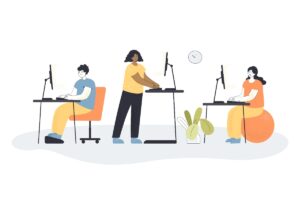Before we explore the answer, it’s worth reflecting on why it perhaps seems like a strange question.
Do we tend to see too much sleep negatively in organisations?
The prevailing culture of work and business has tended to be one where at best, sleep is seen as the responsibility of the employee rather than the organisation.
Or at worst where sleep is seen in negative terms as something that gets in the way of productivity.
The idea that long hours makes us successful is a deeply ingrained narrative, we’re all too familiar with the narrative of leader’s emphasising just how few hours sleep they got by on. Or at least it is much harder to think of contrasting examples to the stories that Margaret Thatcher got by on 4 hours a night from leaders emphasising just how many hours they thrived on!
Even with the best intentions it can be hard to shake the narrative that tough jobs require sacrificing sleep. Recent coverage of what are no doubt laudable steps being taken by a top ‘magic circle’ law firm to improve the work life balance of their teams came with some caveats. The positive news about employees no longer needing to be on camera for calls after 8pm or respond to emails after 10pm was accompanied by quotes from lawyers about how their roles still came with the expectation of constant access from their clients.
Challenging the convention that success in life and good sleep are incompatible
But the narrative that success and sleep are incompatible needs challenging. Both from the perspective of individual health, wellbeing and effectiveness. And from the perspective of organisational productivity.
As well as inspiring no lesser a business leader than Bill Gates to reappraise his belief in all nighters as a key element of business productivity, the publication of Dr Matthew Walker’s authoritative book, “Why we sleep” has brought sleep to the top of the agenda when it comes to supporting our own personal wellbeing. A recent checklist by US based The Wellbeing Project placed sleep as the no 1 focus for supporting personal wellbeing and The Mental Health Foundation’s detailed report into sleep shows the importance they place on it as a foundation for our wellbeing and resilience.
More and more research supports the conclusion that sleep aids our personal wellbeing. It can impact on memory, concentration, mood, immunity, body weight, balance, blood pressure, cardiovascular health and many other body systems that support our Mental Fitness.
So as individuals, ensuring we get enough sleep is potentially a critical foundation for our wellbeing?
So what does getting enough sleep mean for organisations?
We think it presents an opportunity.
More and more research is also exploring the impact of sleep on productivity. A 2017 study showed that “insufficient sleep can result in large economic costs in terms of lost GDP and lower labour productivity” with findings suggesting that workers who sleep less than six hours per day reporting a 2.4 percentage point productivity loss versus workers sleeping between seven to nine hours per day. Meanwhile a 2010 study of 4 large US organisations in the Journal of Occupational and Environmental Medicine found that poor sleep decreased employee productivity at an estimated cost of $1967 per employee.
Improved sleep = improved resilience = improved productivity.
So we think it’s well worth organisations taking this seriously and asking whether if the organisation is getting enough sleep and whether or not they can help employees with improved sleep patterns.
Want to find out more about sleep and the other foundations of Mental Fitness?
Sleep is just one of the foundations of Mental Fitness. Looking at all of the foundations in the whole is how we truly improve our Mental Fitness, and then wellbeing and performance. Do you want to learn how your own Mental Fitness can be the framework for understanding how you can develop greater self-awareness and grow in your own capability and resilience?
Or, if you play a role in your organisation’s development and that of those who work with you and their Mental Fitness, we’d love to talk.
SLEEP
We’ve created a book list that focusses on sleep, if you like to read (especially before bed!), then check out our Sleep Reading List on our bookshop.
COACH
If you work in HR or People Management, experience Transformational Coaching for yourself with a FREE 1 hour coaching session with one of our highly experienced Coaches.
























